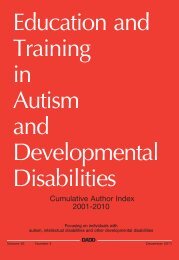Download the Journal (PDF) - Division on Autism and ...
Download the Journal (PDF) - Division on Autism and ...
Download the Journal (PDF) - Division on Autism and ...
Create successful ePaper yourself
Turn your PDF publications into a flip-book with our unique Google optimized e-Paper software.
ti<strong>on</strong>al training, medical treatment, <strong>and</strong> participati<strong>on</strong><br />
in c<strong>on</strong>tracts (Lisi et al.).<br />
It is important to emphasize that legislati<strong>on</strong>,<br />
which is created by each state, has differing<br />
levels <strong>and</strong> scope of guardianship. It might be<br />
expected, <str<strong>on</strong>g>the</str<strong>on</strong>g>refore, that individuals who exhibit<br />
few if any self-determinati<strong>on</strong> skills would<br />
need a full (plenary) guardian to make <str<strong>on</strong>g>the</str<strong>on</strong>g><br />
majority or all decisi<strong>on</strong>s for <str<strong>on</strong>g>the</str<strong>on</strong>g>ir ward, in<br />
c<strong>on</strong>trast to individuals displaying some selfdeterminati<strong>on</strong><br />
skills who would be appointed<br />
a limited guardian to make decisi<strong>on</strong>s <strong>on</strong> specific<br />
issues (e.g., financial decisi<strong>on</strong>s) (Stancliffe,<br />
Abery, Springborg, & Elkin, 2000). It<br />
may also be expected that an individual who<br />
does not need or have a guardian exhibits<br />
self-determinati<strong>on</strong> skills. Essentially, individuals<br />
who have a full or partial guardian could<br />
be perceived as having no or limited capability<br />
to provide informed c<strong>on</strong>sent or to exercise<br />
c<strong>on</strong>trol over <str<strong>on</strong>g>the</str<strong>on</strong>g>ir life in comparis<strong>on</strong> to pers<strong>on</strong>s<br />
without guardians (Abery & Stancliffe,<br />
1996).<br />
Interestingly, <str<strong>on</strong>g>the</str<strong>on</strong>g> research <strong>on</strong> <str<strong>on</strong>g>the</str<strong>on</strong>g> extent to<br />
which guardian appointments impact self-determinati<strong>on</strong><br />
is limited, <strong>and</strong> in many instances<br />
dated. In <strong>on</strong>e topic related study, Lindsey <strong>and</strong><br />
Luckass<strong>on</strong> (1991) suggested that service providers<br />
frequently allowed or encouraged family<br />
members to make decisi<strong>on</strong>s as if <str<strong>on</strong>g>the</str<strong>on</strong>g>y were<br />
<str<strong>on</strong>g>the</str<strong>on</strong>g> guardian for an individual with a disability<br />
who did not legally have <strong>on</strong>e appointed. This<br />
suggests that some equate disability with incompetence<br />
<strong>and</strong> limited ability. In ano<str<strong>on</strong>g>the</str<strong>on</strong>g>r<br />
study, Lindsey (1994) evaluated 69 adults, who<br />
had developmental disabilities capacity to give<br />
informed c<strong>on</strong>sent to community residential<br />
placements. In this study, it was found that<br />
<str<strong>on</strong>g>the</str<strong>on</strong>g>re were no significant differences regarding<br />
<str<strong>on</strong>g>the</str<strong>on</strong>g> ability to give informed c<strong>on</strong>sent between<br />
individuals who ei<str<strong>on</strong>g>the</str<strong>on</strong>g>r had or did not<br />
have a court appointed guardian. This brings<br />
to questi<strong>on</strong> <str<strong>on</strong>g>the</str<strong>on</strong>g> need of legal guardian appointments.<br />
In a more recent study, Stancliffe,<br />
et al. (2000) attempted to compare self-determinati<strong>on</strong><br />
competencies dem<strong>on</strong>strated by<br />
adults with disabilities by using results from<br />
self-determinati<strong>on</strong> related scales completed by<br />
residential agency care providers. Stancliffe et<br />
al. anticipated that adults with disabilities who<br />
had no guardian would be perceived as exhibiting<br />
more self-determinati<strong>on</strong> competencies<br />
<strong>and</strong> c<strong>on</strong>trol over <str<strong>on</strong>g>the</str<strong>on</strong>g>ir lives in comparis<strong>on</strong> to<br />
280 / Educati<strong>on</strong> <strong>and</strong> Training in Developmental Disabilities-September 2008<br />
<str<strong>on</strong>g>the</str<strong>on</strong>g>ir peers who had guardians. Findings revealed<br />
that <str<strong>on</strong>g>the</str<strong>on</strong>g> level of pers<strong>on</strong>al c<strong>on</strong>trol exhibited<br />
by 76 adults (ages ranging between<br />
20.8 to 71.7, with <str<strong>on</strong>g>the</str<strong>on</strong>g> average age of 37.3, sd <br />
11.6; full IQ mean scores ranging from 42.3 to<br />
62.6) who did not have guardians were perceived<br />
by agency pers<strong>on</strong>nel as higher than<br />
those individuals who had ei<str<strong>on</strong>g>the</str<strong>on</strong>g>r partial or full<br />
guardians. The authors c<strong>on</strong>cluded that <str<strong>on</strong>g>the</str<strong>on</strong>g>ir<br />
findings “provide objective evidence that individuals<br />
with less restrictive substitute decisi<strong>on</strong>making<br />
arrangements actually do exercise<br />
greater c<strong>on</strong>trol over <str<strong>on</strong>g>the</str<strong>on</strong>g>ir lives.” (p. 417).<br />
Given <str<strong>on</strong>g>the</str<strong>on</strong>g> findings of <str<strong>on</strong>g>the</str<strong>on</strong>g> studies noted above,<br />
it is clear that more research is necessary that<br />
examines <str<strong>on</strong>g>the</str<strong>on</strong>g> complexity of guardianship.<br />
Fur<str<strong>on</strong>g>the</str<strong>on</strong>g>r, when c<strong>on</strong>sidering IDEA, <strong>and</strong> <str<strong>on</strong>g>the</str<strong>on</strong>g><br />
impact guardian appointments may or may<br />
not have <strong>on</strong> <str<strong>on</strong>g>the</str<strong>on</strong>g> rights of individuals, it is clear<br />
that research in <str<strong>on</strong>g>the</str<strong>on</strong>g> area of guardianship <strong>and</strong><br />
its impact <strong>on</strong> self-determinati<strong>on</strong> is needed,<br />
particularly with respect to school-aged adults<br />
who have disabilities. Interestingly, <str<strong>on</strong>g>the</str<strong>on</strong>g> relati<strong>on</strong>ship<br />
has been rarely been examined.<br />
Within <str<strong>on</strong>g>the</str<strong>on</strong>g> last 10 years, Millar, <strong>and</strong> colleague,<br />
(Millar & Renzaglia, 2002; Millar, 2003) c<strong>on</strong>ducted<br />
studies that investigated guardianship<br />
in relati<strong>on</strong> to young adults who had developmental<br />
disabilities that were in <str<strong>on</strong>g>the</str<strong>on</strong>g> transiti<strong>on</strong><br />
phase of <str<strong>on</strong>g>the</str<strong>on</strong>g>ir educati<strong>on</strong>. By reviewing over<br />
220 guardianship court files, it was found that<br />
guardians, as stated <strong>on</strong> court petiti<strong>on</strong> forms<br />
most often completed by parents, were<br />
needed because <str<strong>on</strong>g>the</str<strong>on</strong>g> student (a) reached <str<strong>on</strong>g>the</str<strong>on</strong>g><br />
age of majority (18 years of age), <strong>and</strong> (b) had<br />
limited or no ability to make decisi<strong>on</strong>s. It was<br />
also found that <str<strong>on</strong>g>the</str<strong>on</strong>g> evidence used to “prove”<br />
“incompetence” was unclear, <strong>and</strong> that in<br />
100% of <str<strong>on</strong>g>the</str<strong>on</strong>g> cases a guardian (most often a<br />
parent) was appointed. Review of annual reports<br />
submitted to courts by guardians found<br />
that <str<strong>on</strong>g>the</str<strong>on</strong>g> majority of wards’ “c<strong>on</strong>diti<strong>on</strong>s” of<br />
“having limited or no capacity to make decisi<strong>on</strong>s”<br />
reportedly remained unchanged following<br />
guardian appointments.<br />
In a related investigati<strong>on</strong>, Millar (2007)<br />
c<strong>on</strong>ducted focus groups with sec<strong>on</strong>dary special<br />
educati<strong>on</strong> teachers, parents (both who<br />
were legal guardians <strong>and</strong> who were not), <strong>and</strong><br />
young adults with disabilities (both who had<br />
legal guardians <strong>and</strong> who did not) to determine<br />
<str<strong>on</strong>g>the</str<strong>on</strong>g>ir knowledge of guardianship <strong>and</strong><br />
self-determinati<strong>on</strong>. It was learned that <str<strong>on</strong>g>the</str<strong>on</strong>g> par-
















